Note: NPR's First Listen audio comes down after the album is released.

At his best, Ty Segall is a master songwriter trapped in the body of a punk — although the limitations of his garage-inflected rock actually keep him grounded and focused rather than restricted. The California bandleader's prolific output over the past decade has grown increasingly ambitious in its own humble and rough-hewn way; at the same time, he refuses to set aside the gnarled riffs, spilled booze and busted knuckles of his most blistering work. That hasn't changed on his latest album (his second, after one in 2008, to bear the name Ty Segall). What's different is an even more ardent attempt at confining chaos and squeezing catchy, catastrophically massive pop gems out of it.
"Break A Guitar" busts the album wide open right at the outset, as it harnesses a thunderous glam-rock stomp that barely conceals huge hooks and Segall's supple, helium-infused melodies. "Take my guitar / I'll be at the bar," he sings at the end, adding a Replacements-esque twist to an otherwise swaggering demonstration of rock 'n' roll overconfidence. The distortion grows even more corrosive in "The Only One," whose dueling guitar leads (between Segall and his longtime second guitarist Emmett Kelly) erupt gloriously into a fugue of frenzied abandon. "Thank You Mr. K" ups the ante even further, succumbing to a psychedelic-meets-hardcore attack that chugs along at the breakneck speed of a bad, bleak trip.
But Ty Segall does more than throttle and thrash. "Talkin'," a pointed parable about self-absorption, is wrapped in softly strummed acoustic guitars. "Orange Color Queen" picks up on the same vibe, but with a more reflective bent; like a daydream on a rowboat in the middle of a slow-moving river, the song meanders through a vivid landscape of heartache while Segall does his best impression of a warbling angel. Mikal Cronin, the group's bassist (and an excellent bandleader in his own right), joins Segall on vocals in "Take Care (To Comb Your Hair)," another acoustic song whose plaintive, plucky tendencies shift deliriously from folky tenderness to needling, fuzzed-out riffage by song's end.
The album's most ambitious moments, though, appear in "Warm Hands (Freedom Returned)." At 10-plus minutes, it's a break from Segall's standard three-and-a-half-minute hand grenades; heroically, it doesn't waste a second in its pursuit of pop-history synthesis, starting out as a paint-peeling ball of snarling menace before dissolving into a wonderfully sparse, spacious jam. "Papers" may not be as ambitious, lengthwise, but it stretches Segall's canvas in a different way. Keyboardist Ben Boye's piano is given a more prominent spot in the complex arrangement, and the entire song reflects a Beatles-like sense of sophistication, complete with cryptic lyrics and elusive melancholia. Segall's role models are still as plain as day — Marc Bolan, Ray Davies and Syd Barrett chief among them — but on Ty Segall, he's taken yet another strong step toward turning retroactive garage rock into high art.
Copyright 2022 NPR. To see more, visit https://www.npr.org.


